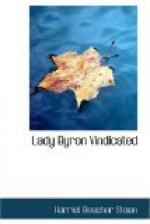’I sent home for Moore, and for Moore only (who has my journal also), my memoir written up to 1816, and I gave him leave to show it to whom he pleased, but not to publish on any account. You may read it, and you may let Wilson read it if he likes—not for his public opinion, but his private, for I like the man, and care very little about the magazine. And I could wish Lady Byron herself to read it, that she may have it in her power to mark any thing mistaken or misstated. As it will never appear till after my extinction, it would be but fair she should see it; that is to say, herself willing. Your “Blackwood” accuses me of treating women harshly; but I have been their martyr; my whole life has been sacrificed to them and by them.’
It was a part of Byron’s policy to place Lady Byron in positions before the world where she could not speak, and where her silence would be set down to her as haughty, stony indifference and obstinacy. Such was the pretended negotiation through Madame de Stael, and such now this apparently fair and generous offer to let Lady Byron see and mark this manuscript.
The little Ada is now in her fifth year—a child of singular sensibility and remarkable mental powers—one of those exceptional children who are so perilous a charge for a mother.
Her husband proposes this artful snare to her,—that she shall mark what is false in a statement which is all built on a damning lie, that she cannot refute over that daughter’s head,—and which would perhaps be her ruin to discuss.
Hence came an addition of two more documents, to be used ’privately among friends,’ {43} and which ‘Blackwood’ uses after Lady Byron is safely out of the world to cast ignominy on her grave—the wife’s letter, that of a mother standing at bay for her daughter, knowing that she is dealing with a desperate, powerful, unscrupulous enemy.
’Kirkby Mallory: March 10, 1820.
’I received your letter of January 1, offering to my perusal a Memoir of part of your life. I decline to inspect it. I consider the publication or circulation of such a composition at any time as prejudicial to Ada’s future happiness. For my own sake, I have no reason to shrink from publication; but, notwithstanding the injuries which I have suffered, I should lament some of the consequences.
’A. Byron.
‘To Lord Byron.’
Lord Byron, writing for the public, as is his custom, makes reply:—
’Ravenna: April 3, 1820.
’I received yesterday your answer, dated March 10. My offer was an honest one, and surely could only be construed as such even by the most malignant casuistry. I could answer you, but it is too late, and it is not worth while. To the mysterious menace of the last sentence, whatever its import may be—and I cannot pretend to unriddle it—I could hardly be very sensible




